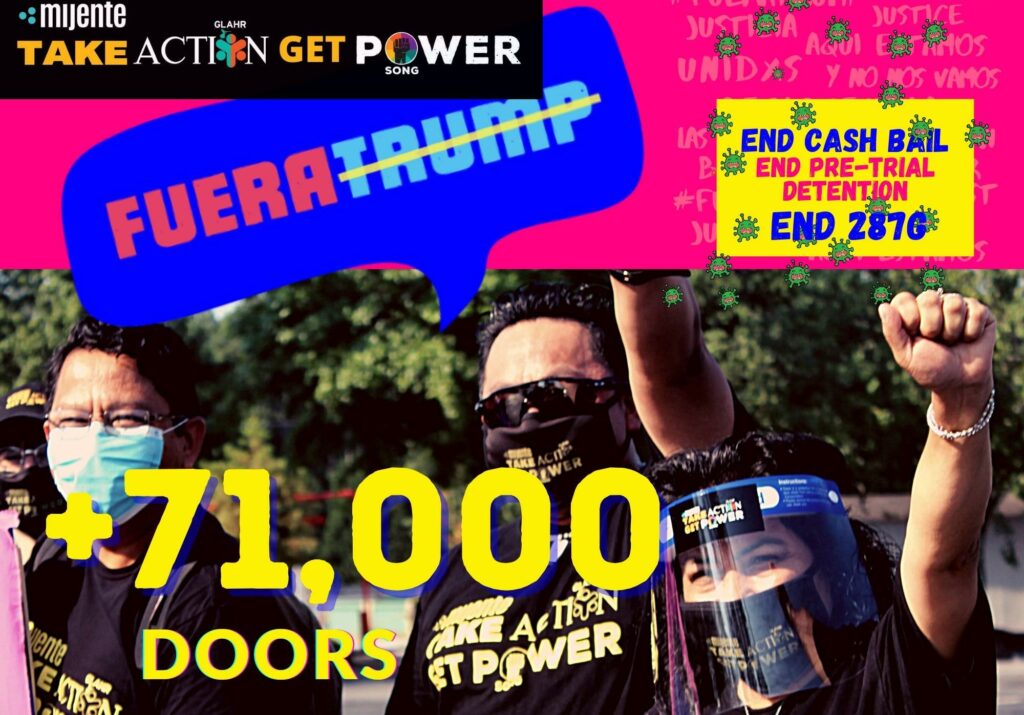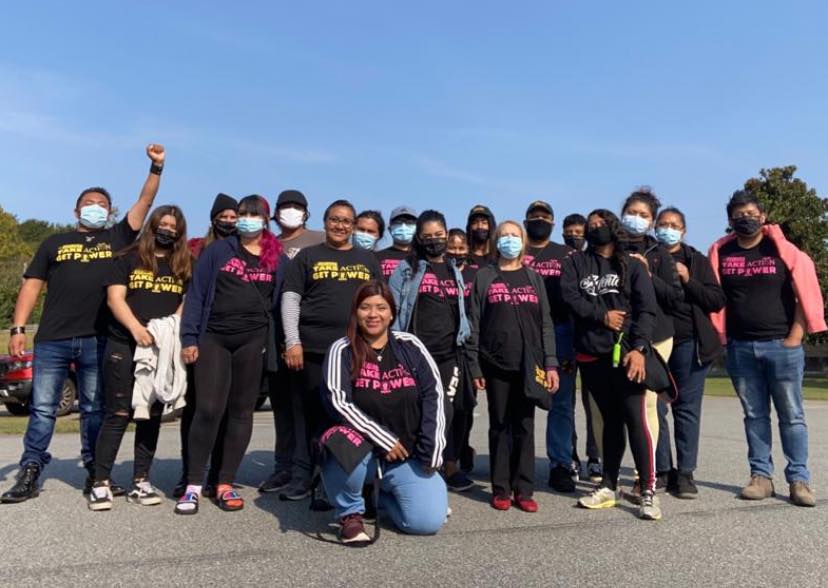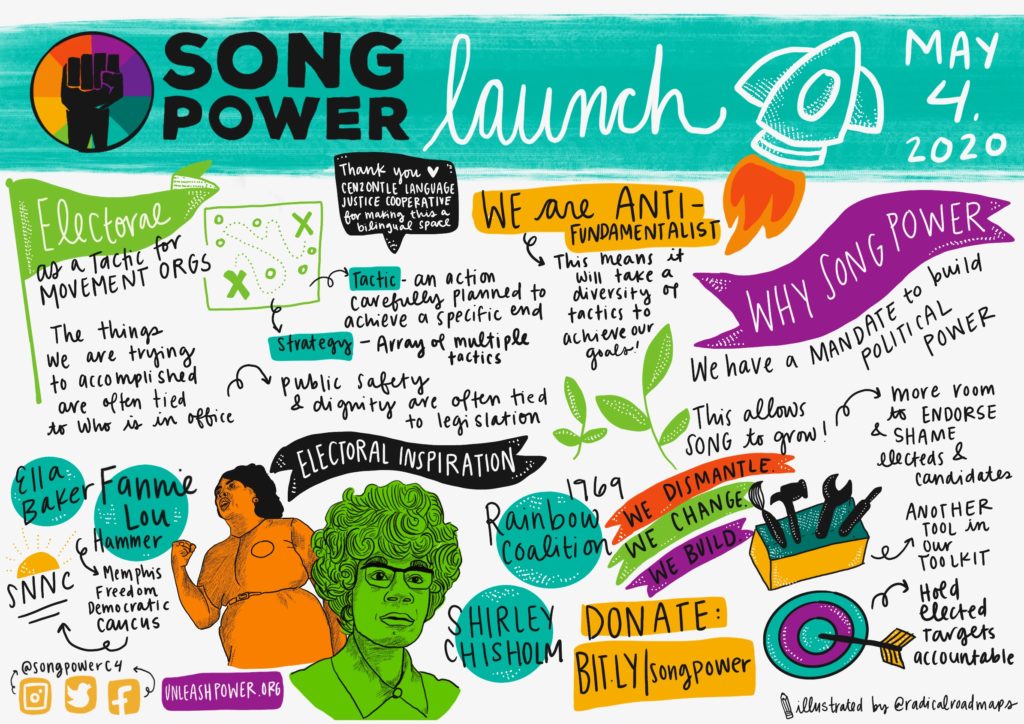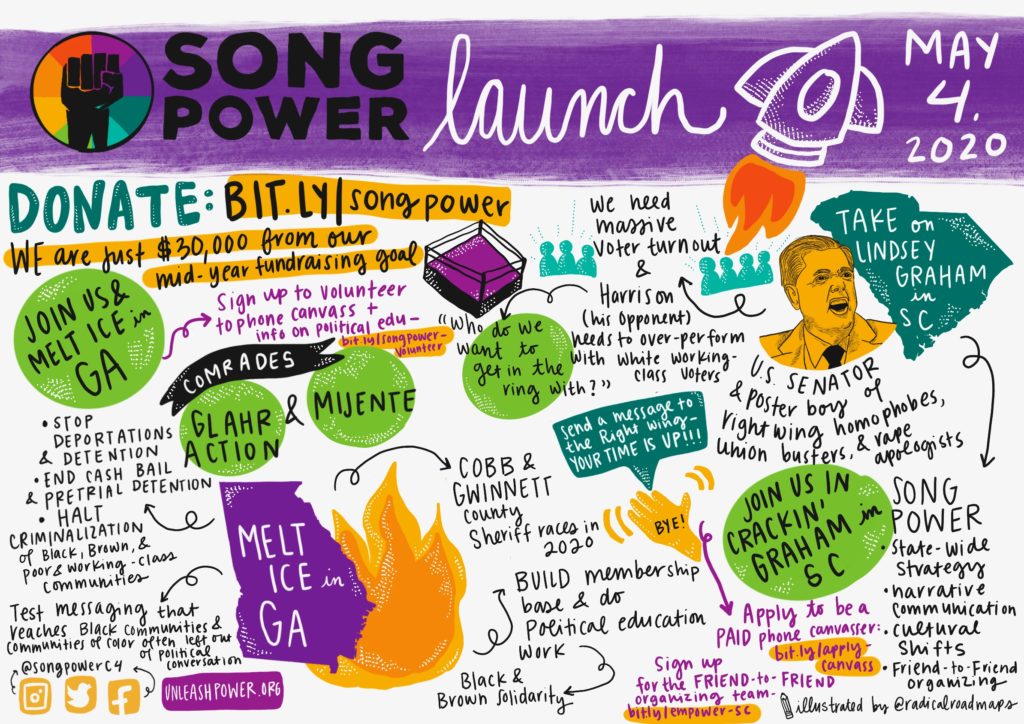As we forge a New South that is about all of us, what do we want to see?
Spaces that honor folks that we lost in this process. Folks whose names we don’t know but use passcodes. Who had to meet up in juke joints or barns or back rooms. Had to connect in any kind of way they could for abolitionist work or just to throw down and be magically queer together. Anyway, they could to just show love and Be Loved: those are the spaces and folks I want to honor. Folks who created Good Trouble and it built us and we’re here, organizing and throwing down, and we wouldn’t be here if it were not for those folks who sacrificed sometimes life and limb for us to be in this place.
Robert-John Hinojosa, West Columbia, SC
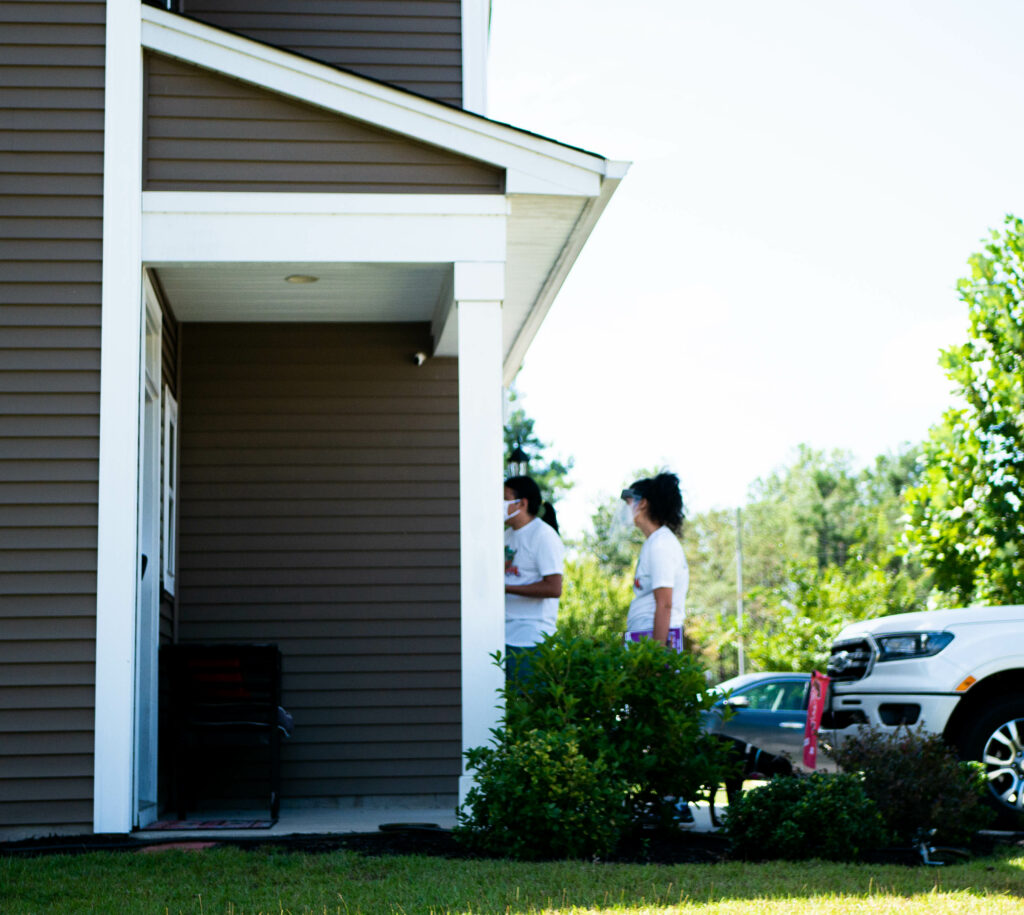
This election cycle SONG Power fought on the frontlines of South Carolina and Georgia. In Georgia, following the leadership of GLAHR Action and Mijente, we fought to unseat two racist sheriffs and change the organizing conditions to #MeltICE and #EndMoneyBail in Gwinnett and Cobb counties. And … we won! Our immigrant comrades led the charge and we are so honored to have knocked over 150,000 doors of Black and brown Georgians to secure this victory and to flip the state of Georgia blue.
In South Carolina the fight to #CrackGraham called our name, and we answered the call to send Senator Lindsey Graham home. Graham is the ultimate poster boy of rightwing (internalized) homophobes, union busters, and rape apologists, who’s nevertheless held his seat for 17 years and counting. Since Trump’s election, Graham has doubled down on his ass-kissing and renewed his commitment to a regressive vision of South Carolina and the nation, including fast tracking the appointment of a new conservative Supreme Court justice. We couldn’t be prouder of our members and team in the field in South Carolina, riding dirty on country highways to get out that last yard sign, wearing two sweatshirts in the first cold snap of fall in the South to make sure voters in line have hand sanitizer, hunkered down to stay safe at home and making calls using not the cutting edge political data tools, but a basic ass spreadsheet to make sure our last 900 contacts get the info they need, startling a bit when a huge military jet flies overhead while out here knocking doors in the apartment complexes and mobile home parks where we find our sweet queer family, sheltered under Spanish moss and oaks.
We organized and continue to organize in a state and a region ravaged by coronavirus and in a state currently ruled with an iron fist by many who outright long for the days of chattel slavery. Our wins are rarely guaranteed here. But our longing, our legacy, our courage, and our vision hold us steadfast in our drive to build a New South where all can live free from fear.
I’m thinking a lot about the communities, the strong Black communities that have insulated themselves and were self sufficient and did the education of the community. The communities I grew up in and my grandparents grew up in and the knowledge and sense of self that they tried to pass on and that sustains the Movement in a different way. I am a South Carolinian and my roots run deep here. One of my family members is in the lynching museum in Alabama; since then, I have been learning more about my familiy and our legacy — the tenacity and resistance and fight it takes to survive generations and generations and generations in a hostile place like this.
It seems hard now but we’ve been through so much worse; it gives me a different type of hope for the future. We are closer to a New South than our ancestors were. It’s exciting to be part of a Movement and a people who want to keep being resistant and keep being troublemakers. In the New South I want to keep uplifting trouble making, resistance, and resilience and what it really takes to have all those things and how amazing it is to really survive.
Auburn Wideman, West Columbia, SC
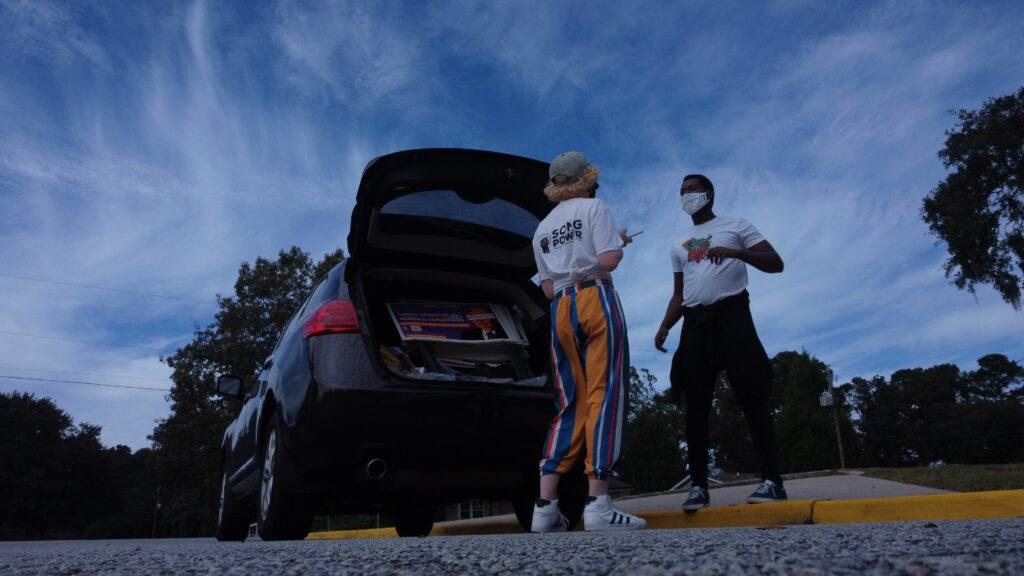
In South Carolina, like so many other states where the Rightwing has run unopposed for decades, we experience the concentrated effects of white supremacy, capitalism, misogyny, and homophobia every day. Resilience runs deep here as does pain and cynicism, after so many decades and generations of neglect. At SONG Power, we believe that both the barriers to justice and the potential wins are greater in states in the Deep South like South Carolina. These wins will only come with long term investment. As we know from community organizing, especially in marginalized and under resourced places, transformation isn’t immediate but takes time and investment beyond the electoral calendar.
We launched SONG Power because we believe we must build political power to take what we want and what our communities deserve. In this moment, the Right has more consolidated power than we have seen in our lifetime. The South bears the brunt of their experiments — many of the places we live are the testing ground for policies that harm, sicken, divide, disenfranchise, and kill our communities. We believe we must work to change the rules to alleviate the suffering of our communities. We believe we must turn up the heat on the targets who are getting in the way of the public pressure campaigns we are building, running, and winning to #EndMoneyBail and #MeltICE. Our targets are elected. Those who will not do the people’s will can and must be held accountable. We believe that we must build our base and invite more and more people into the Movement in this time. Our constituency (the people impacted by the issues we organize around) is huge, even though at times our numbers may seem small. And we are clear: engaging in electoral fights is a tactic to build our power as we continue to demand, vision, and fight for complete and utter societal and political transformation far beyond the ballot box.
We are changed by this fight. The #CrackGraham campaign gave us the opportunity to connect with more Black, Latinx, rural, queer and gay folk throughout South Carolina. We were able to build collaborations and relationships with other organizations that we hadn’t had access to prior to this. We ran a statewide organizing strategy engaging elements of a traditional field program with cultural and community events, direct actions and relational organizing (aka community organizing). As coronavirus ravaged South Carolina our strategy had to shift. Coronavirus and widespread unemployment were key issues in our campaign the entire time. We made over 30,000 calls and had over 11,000 deep canvass conversations with Black, brown, and white poor and working-class women in South Carolina over the summer and fall. We started with common ground of how we are all being impacted by the pandemic — what did folks need? We spoke about shared values of helping out each other’s communities before ever asking what they thought of Lindsey Graham. At the end of these conversations we saw a 15 point shift to people not planning to vote for Graham!
“I would like to uplift South Carolinians like Eartha Kitt and people who did the unglamorous and perhaps the most important work of just surviving long enough to get all of us here. I want to see more of those normal stories captured and honored in history.”
Brittany Washington, Walterboro, SC
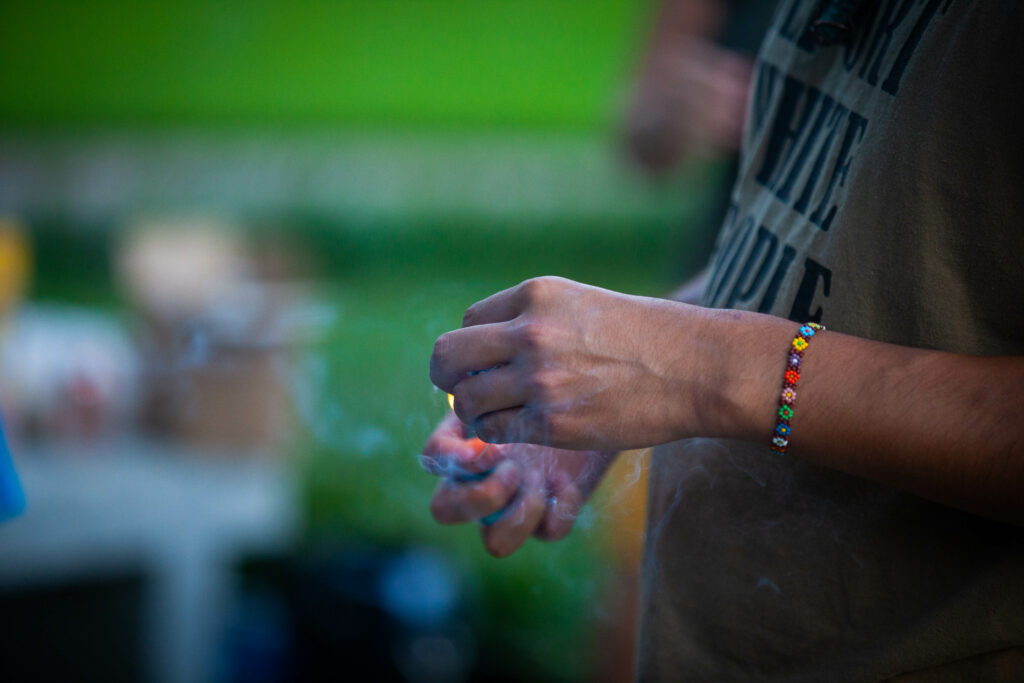
Votes are still being counted in South Carolina and voter suppression is alive and well. 2,500 ballots alone were thrown out because of the requirement to sign the outside of the envelope. 14,000 ballots are being hand counted in Dorchester County now from a printing error. 47,000 residents cannot vote due to felony disenfranchisement, including over 38,000 Black people (4% of the Black population in South Carolina).
Through this campaign we have work to seed the ground for a New South. To reach into pockets, counties, and communities that have been structurally neglected and pushed to the margins. Last weekend knocking doors a Black couple told our canvassers “screw Lindsey Graham, let’s build a different South. But we can’t take one of your yard signs because we don’t want anyone to burn our house down. So I won’t be putting that in my yard but I’m with you.”
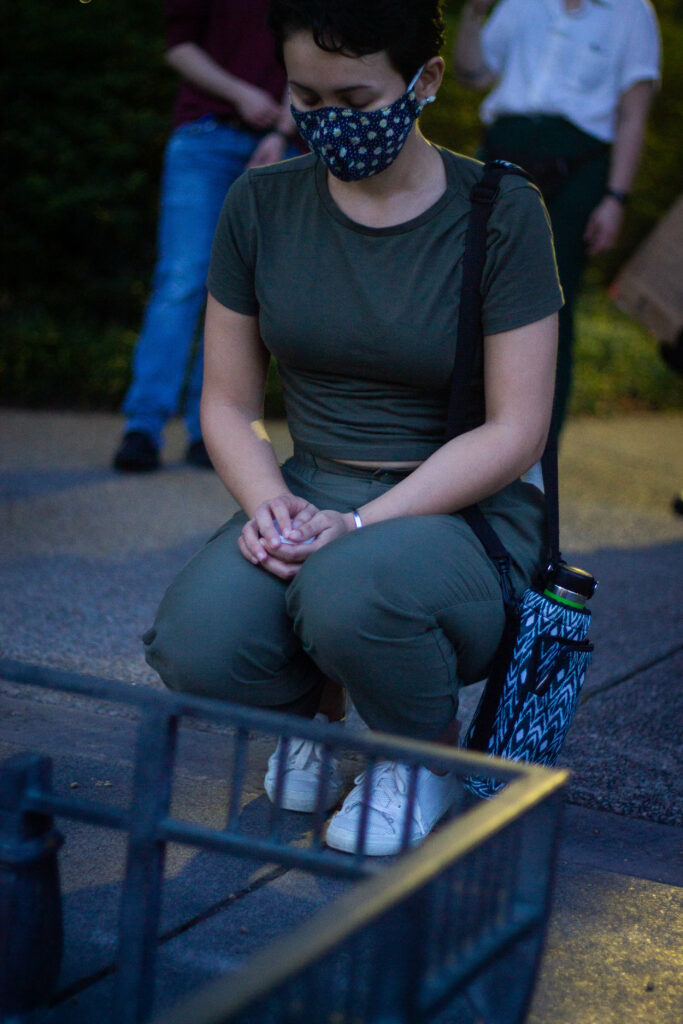
“I would like to honor those who are frontliners, teachers, educators, those that are also fighting up against the pandemic and having to alter their lives around the region and the community. A lot of everyday people, teachers and those that are dealing with fronthand and everyday, I would like to see a continuance of caring about them as well. A continuance of non-profit organizations volunteering and getting out here and doing what we need to do to get our hands dirty. That’s the only way we will see change.”
Deborah, Columbia, SC
Much of Jaime Harrison’s strategy relied on the losing Democratic establishment formula. This formula is: Don’t rock the boat, keep the message vague to try and please everyone. Buy more and more advertisements, but don’t put a cent into organizers on the ground. We believe our people are not stupid and they are not weak. We believe it is essential to have organizers from and of the communities we are organizing in, on the ground, setting strategy and talking to as many folk as they can about the actual conditions of our lives. Our folk want real, material, transformative change. If only grassroots organizing were invested in here like Harrison’s campaign was — to the tune of over $100 million. If we had those resources, imagine what we could do in our communities. Help folks get flu shots for free, dental checks or eye checks. Partner with groups in the community so we could get access good clean water and safe places to sleep. Food drops and blankets and reliable transportation.
“We made Graham fight for his seat and call in favors he will have to owe,” said one of our members. “Our ancestors endured so much more, more than we can even imagine,” reminds Robert-John Hinojosa, SONG Power Campaign Lead. “The blood, the sweat, the struggle for liberation, these aren’t just chants. This is the lifeline that connects our Beloved Community.”
We here. We been here. We’re not going anywhere. This is our home. What South Carolina needs beyond this election is bread-and butter community organizing. Organizers who know their community and can forge relationships across communities. Organizing to create Beloved Community is the antidote, and we plan to do just that. And don’t think we aren’t coming for your neck Graham. Queers, Immigrants, All Of Us.


